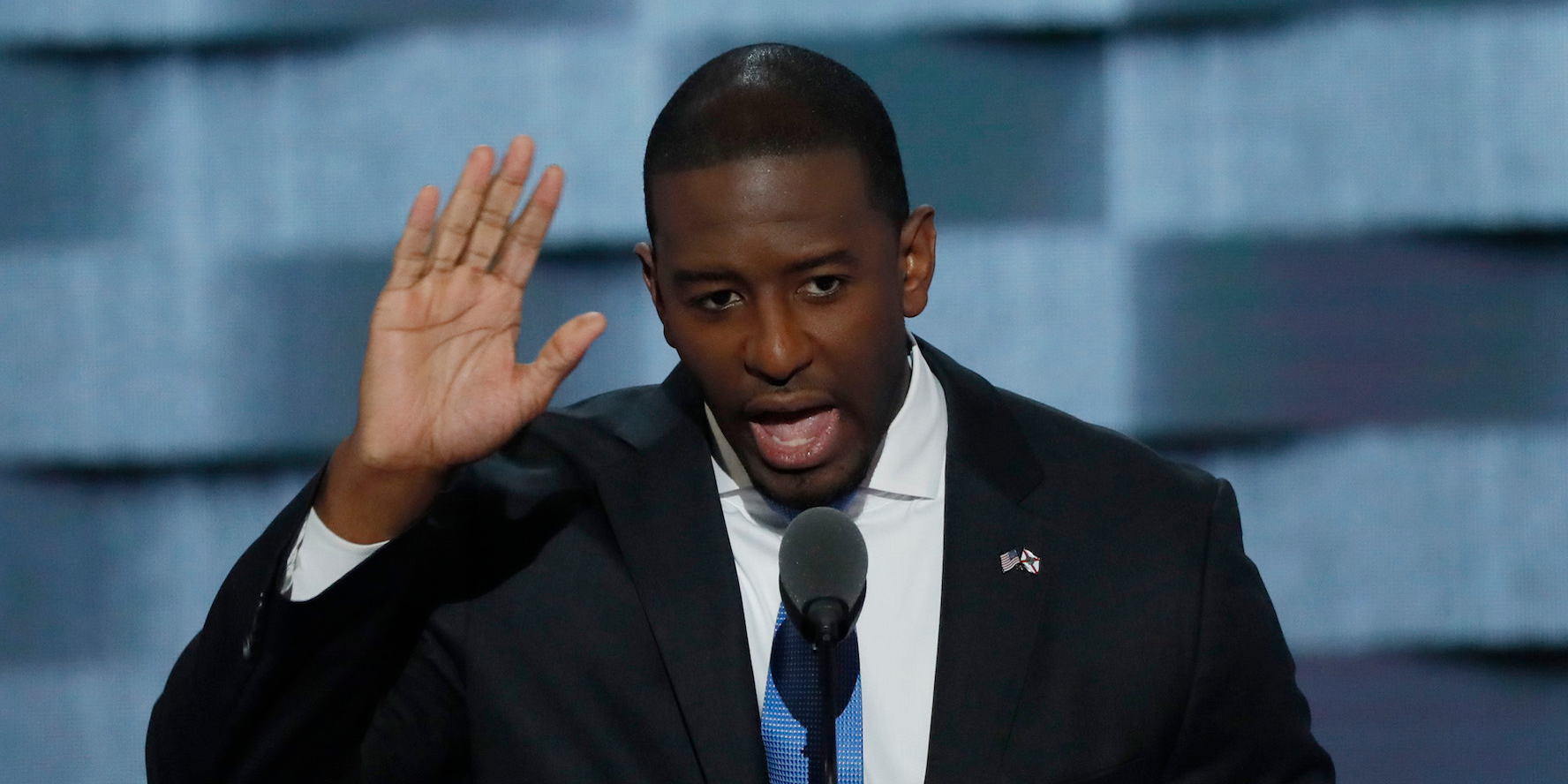- In states across the US, Democratic voters are embracing progressive candidates in gubernatorial races, marking a major shift in the party’s politics.
- On Tuesday night, Tallahassee Mayor Andrew Gillum won the Democratic primary election for governor of Florida, becoming the first black gubernatorial nominee in the state’s history.
- With Gillum’s victory, Democrats have three black, progressive candidates for governor in November’s midterms.
In states across the US, Democratic voters are embracing progressive candidates in gubernatorial races, marking a major shift in the party’s politics.
Beyond indicating a slide toward progressivism for Democrats, a number of these candidates also have the chance to make history from a demographic standpoint.
On Tuesday night, Talahassee Mayor Andrew Gillum won the Democratic primary election for governor of Florida, becoming the first black gubernatorial nominee in the state’s history.
Gillum, who supports policies such as legalizing marijuana, abolishing Immigration and Customs Enforcement (ICE), and Medicare-for-all, was endorsed by progressive darling Sen. Bernie Sanders. He defeated former US Rep. Gwen Graham, who’s decidedly more centrist. He will now face Republican nominee US Rep. Ron DeSantis.
The race between Gillum and DeSantis, who was endorsed by Trump, epitomizes the deeply polarized nature of US politics at the moment.
Within less than a day of the primary result, DeSantis drew ire after he made a racially-charged remark about Gillum. DeSantis also slammed Gillum for his "far-left views" as he contended the Democratic nominee would make a mess of things in Florida if elected.
“I believe that Florida and its rich diversity are going to be looking for a governor who’s going to bring us together. Not divide us. Not misogynists. Not racists,” Andrew Gillum said after Ron DeSantis warned Floridians not to “monkey this up” by voting for his black opponent. pic.twitter.com/UogaVORFWG
— POLITICO (@politico) August 29, 2018
President Donald Trump also went after Gillum on Twitter, describing him as a "failed Socialist Mayor." This comes amid reports Trump recently warned Christian leaders there will be "violence" if the GOP doesn't perform well on Election Day.
Indeed, it seems that diverse, strongly left-leaning candidates have Trump and his supporters quite concerned about what could happen in November.
History could be made in November in multiple races
With Gillum's victory, Democrats have three black, progressive candidates for governor in November's midterms.
The Talahassee mayor joins Stacey Abrams of Georgia and Ben Jealous of Maryland in that regard. Abrams and Jealous were also endorsed by Sanders.
Meanwhile, David Garcia, a progressive Latino, won the Democratic primary election for governor in Arizona on Tuesday. Garcia, like Gillum, supports policies such as abolishing ICE and Medicare-for-all.
All four states had centrist candidates four years ago, but in the Trump era progressives are seemingly taking the Democratic Party by storm.
Moreover, Gillum could now become the first black governor of Florida, Jealous the first black governor of Maryland, and Garcia the first Latino governor of Arizona in decades. And if Abrams wins, she would be the first black female governor in US history.
Notably, there are no black governors in any of the 50 states at present.
Correspondingly, the Democratic nominee for governor of Idaho, Paulette Jordan, is also a progressive and has the chance to make history in November. Jordan could be the first Native American governor in the US.
Democratic voters are embracing unconventional candidates
In states like Florida, Georgia, and Arizona, which have large cohorts of conservative voters, it can be risky for candidates to embrace left-wing politics.
Gillum and Garcia have been decried as dangerous socialists by their opponents. Abrams, who is an unapologetic progressive but isn't quite as far to the left as Gillum and Garcia on issues like healthcare and immigration, has even faced similar attacks.
But the stark contrast such candidates offer to Trump's hyper-nationalistic brand of politics seems to have attracted Democratic voters. "Socialist" is no longer such a dirty word in America's political discourse.
In short, 2018 has opened the door for unconventional Democratic candidates to win in an array of races. Alexandria Ocasio-Cortez's stunning upset over US Rep. Joe Crowley in New York's 14th Congressional District is emblematic of that fact.
'The progressive movement is transforming the country'
As it happens, Ocasio-Cortez was among the first to celebrate Gillum's big win on Tuesday night. After the news of Gillum's victory broke, she tweeted, "The progressive movement is transforming the country - and he proved that again tonight."
Congratulations, @AndrewGillum!
The progressive movement is transforming the country - and he proved that again tonight.
Gillum ran on Medicare for All, Legalizing Marijuana, #AbolishICE & more.
Thank you, Florida voters!
On to November 💪🏽💜 https://t.co/8keyzxVmcf
— Alexandria Ocasio-Cortez (@AOC) August 29, 2018
As in any election, none of these candidates are guaranteed to win this fall, but they aren't necessarily long-shots either.
Ultimately, the results of their respective races could have significant implications for not only Trump's agenda, but also the Democratic party's platform and presidential nominee in 2020.
Simply put, the era of centrist Democratic candidates could be nearing an end as the party desperately searches for an antidote to Trumpism.

